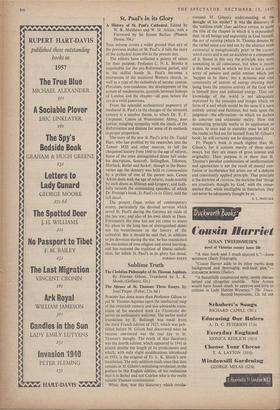St. Paul's in its Glory
Tuts volume covers a wider ground than any of the previous studies of St. Paul's; it tells the. story of the cathedral from 604 to the present day.
The editors have collected a galaxy of talent for their purpose. Professor C. N. L. Brooke is responsible for the pre-Reformation period, and in his skilful hands St. Paul's becomes a microcosm of the mediaeval Western church, as well as a type of the cathedrals of secular canons. Pluralism, non-residence, the development of the system of residentiaries, quarrels between bishops of London and the chapter—all pass before the eye in a vivid panorama.
From the splendid ecclesiastical pageantry of mediaeval St. Paul's to the changes of the sixteenth century is a sombre theme, to which Dr. E. F. Carpenter, canon of Westminster Abbey, does justice; mingling sympathy with the ideals of the Reformation and distaste for some of its methods in proper proportion.
The story of the new St. Paul's is by Dr. Tindal Hart, who has profited by his researches into the Tanner MSS and other sources, to tell the chequered history from 1660 to the age of reform.. Some of the most distinguished deans fall under his description, Sancroft, Stillingfleet, Tillotson, Sherlock, Butler and Secker; though in the Hano- verian age the deanery was held in commendam by a prelate of one of the poorer sees. Canon Atkins deals with the age of reform, made notable by such deans as Milman and Gregory; and faith- fully records the outstanding episodes, of which Dr. Prestige's book, St. Paul's in its Glory, told the full detail.
The present Dean writes of contemporary events, particularly the devoted services which saved St. Paul's during the German air raids of the late war; and also of his own ideals as Dean. Fortunately the time has not yet come to assess his place in the long line of distinguished deans nor his *contribution to the history of the cathedral. But it should be said that, in addition to his devotion during the war, he has maintained the succession of true religion and sound learning, and has restored the tradition of liberal catholi- cism, for which St. Paul's in its glory has stood.
NORMAN SYKES






































 Previous page
Previous page